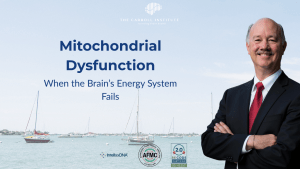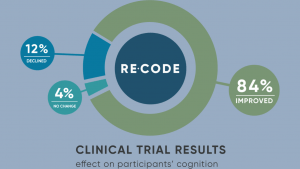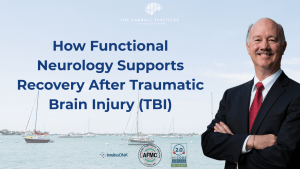Last Updated: October 2025
When most people think about hormones, they think of menopause, testosterone, or thyroid function. Few realize that hormones are also powerful regulators of brain health. They influence mood, energy, memory, and even the brain’s ability to repair itself. At The Carroll Institute in Sarasota, Dr. Garland Glenn, DC, PhD, AFMC helps patients uncover hidden hormonal imbalances that contribute to brain fog, fatigue, and cognitive decline. By restoring hormone balance through Functional Medicine and the Bredesen ReCODE Protocol, patients can regain clarity and protect long-term brain function.
Why Hormones Matter for the Brain
Hormones act like messengers, carrying signals between the brain and every organ in the body. They regulate metabolism, inflammation, sleep, and mood. When hormone levels become unbalanced—too low, too high, or poorly converted—brain communication suffers. The result is often subtle at first: slower recall, reduced focus, or increased irritability. Over time, chronic hormone imbalance accelerates neurodegeneration and increases Alzheimer’s risk.
Thyroid Hormones: The Brain’s Energy Switch
Thyroid hormones (T3 and T4) directly influence energy production in brain cells. Low thyroid function or poor thyroid conversion—common in Hashimoto’s hypothyroidism—can cause fatigue, memory lapses, and depression. Unfortunately, conventional testing often misses subclinical thyroid problems that affect the brain before blood levels appear “abnormal.”
Dr. Glenn uses advanced thyroid panels that assess not just TSH, but also free T3, free T4, reverse T3, and thyroid antibodies. By addressing thyroid conversion and autoimmune activity, brain energy and mood frequently improve within weeks.
Estrogen and Progesterone: Neuroprotective Allies
Progesterone and estrogen are essential for maintaining healthy brain structure and function. Estrogen enhances blood flow and supports synapse formation, while progesterone has calming, anti-inflammatory effects. During perimenopause or menopause, declining levels can trigger hot flashes, anxiety, insomnia, and cognitive fog.
In both women and men, low estrogen or testosterone contributes to reduced neuroplasticity—the brain’s ability to rewire and adapt. Restoring healthy hormone balance through individualized care helps re-establish brain resilience and improve memory. Learn more about this approach in Functional Neurology.
Testosterone and DHEA: The Brain’s Motivation Molecules
Testosterone and DHEA aren’t just for muscle or libido—they also protect neurons. Low testosterone levels are linked to increased risk of Alzheimer’s disease, depression, and cognitive fatigue. In both sexes, these hormones enhance dopamine production, supporting drive, motivation, and focus.
Through Functional Medicine testing, Dr. Glenn evaluates adrenal and gonadal hormone pathways, addressing both deficiency and conversion problems. Balanced testosterone and DHEA levels often lead to better mood regulation, sharper thinking, and improved stamina.
Cortisol and Stress: The Brain’s Double-Edged Sword
Cortisol, produced by the adrenal glands, helps manage stress and inflammation. However, chronic stress keeps cortisol elevated, which damages neurons and disrupts sleep and memory formation. Over time, the adrenal glands can “burn out,” leading to low cortisol, fatigue, and poor mental performance.
Balancing cortisol involves more than supplements—it requires retraining the stress response through brain-body therapies. At The Carroll Institute, Dr. Glenn uses Functional Neurology techniques and targeted lifestyle interventions to restore optimal adrenal rhythm, helping patients feel calmer and more focused.
How Hormone Imbalances Trigger Cognitive Decline
- Reduced neuroplasticity: Low hormone levels make it harder for the brain to repair or form new connections.
- Inflammation and oxidative stress: Hormonal imbalance increases inflammatory cytokines that damage neurons. See Inflammation and the Inflamed Brain.
- Disrupted blood flow: Estrogen and thyroid hormones regulate blood vessel dilation and oxygen delivery.
- Mitochondrial dysfunction: Hormones control cellular energy; imbalance weakens mitochondria and promotes fatigue.
- Neurotransmitter depletion: Hormones influence serotonin, dopamine, and GABA levels—critical for mood and cognition.
Functional Medicine Testing for Hormone Imbalances
Dr. Glenn performs comprehensive testing to identify subtle hormone imbalances, including:
- Thyroid panel (TSH, free T3, free T4, reverse T3, antibodies)
- Sex hormone panel (estrogen, progesterone, testosterone, DHEA)
- Adrenal stress index (cortisol rhythm and DHEA)
- Insulin and glucose markers (see Blood Sugar and Brain Health)
Once the data are collected, personalized treatment focuses on restoring optimal hormone levels through nutrition, detoxification, lifestyle modification, and targeted supplementation. Hormone therapy is sometimes recommended, but only when appropriate and closely monitored.
Functional Neurology: Re-training the Brain’s Response to Hormones
Hormones and brain signaling are deeply interconnected. As hormone levels stabilize, Functional Neurology helps re-engage dormant pathways and improve communication between the hypothalamus, pituitary, and adrenal (HPA) axis. This neuro-endocrine coordination is vital for maintaining long-term brain health.
Photobiomodulation and sensorimotor integration therapies—like the Neuronic Photobiomodulation Helmet—further enhance oxygen delivery, cellular energy, and hormone-brain communication.
Rebalancing Hormones to Protect Brain Health
Balancing hormones isn’t just about easing symptoms—it’s about protecting your brain from decline. When thyroid, adrenal, and sex hormones are optimized, patients often notice better sleep, more stable moods, and sharper cognitive performance. Addressing hormonal balance early can even slow or reverse mild cognitive decline.
Take the Next Step Toward Hormonal and Cognitive Balance
If you suspect hormones may be affecting your memory, mood, or energy, it’s time to dig deeper. Book a Discovery Call with The Carroll Institute today to begin a personalized plan that addresses the root causes of hormonal imbalance and supports optimal brain health.
Sources
- Rationale for a Multifactorial Approach to Reversing Cognitive Decline — NIH (2022)
- Precision Medicine Approach to Alzheimer’s Disease — NIH (2023)
- Harvard Health: How Hormones Influence the Brain — Harvard Health Publishing
Medically reviewed by Dr. Garland Glenn, DC, PhD, AFMC (Advanced Functional Medicine Clinician)
The Carroll Institute — Sarasota, FL
Learn more about Dr. Glenn’s background and credentials: About Dr. Garland Glenn
This content is for educational purposes only and does not replace personalized medical advice.

Dr. Garland Glenn, DC, PhD, IFM, AFMC
Founder & Clinical Director, The Carroll Institute — Sarasota, FL
Dr. Garland Glenn is a board-certified chiropractic physician and functional medicine practitioner specializing in cognitive health, neurodegeneration, and root-cause medicine. Certified as an AFMC (Advanced Functional Medicine Clinician) and Institute for Functional Medicine (IFM) trained, he has also completed over 500 hours of advanced training in Functional Neurology under Dr. Ted Carrick, founder of the Carrick Institute.
At The Carroll Institute, Dr. Glenn leads Sarasota’s only ReCODE-certified Functional Neurology program, helping patients reverse or prevent cognitive decline through the Bredesen ReCODE Protocol, neuroplasticity exercises, and personalized functional medicine care.
Learn more about his background and approach at About Dr. Garland Glenn.
– schedule now –
free discovery call
To help you get started, we offer a free 20-minute Discovery Phone Consultation. During this call, you will be able to talk with one of our Certified Brain Health Coaches about what going on with you or your loved one and find out if we can help. Please review our FAQs prior to scheduling your free call. We look forward to talking with you soon and helping you Save Your Brain.
(yes, it’s totally free!)
ReCODE® is a registered program developed by Dr. Dale Bredesen and licensed through Apollo Health. Dr. Garland Glenn is a certified ReCODE practitioner.



